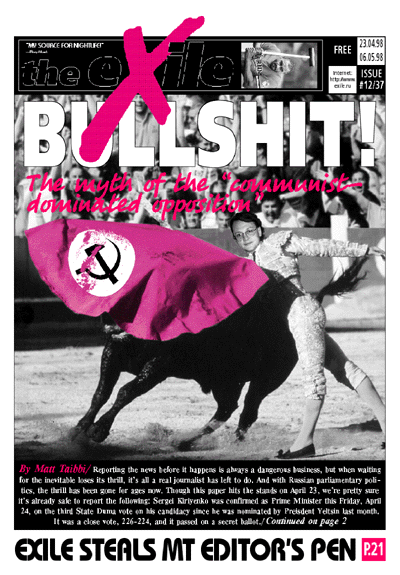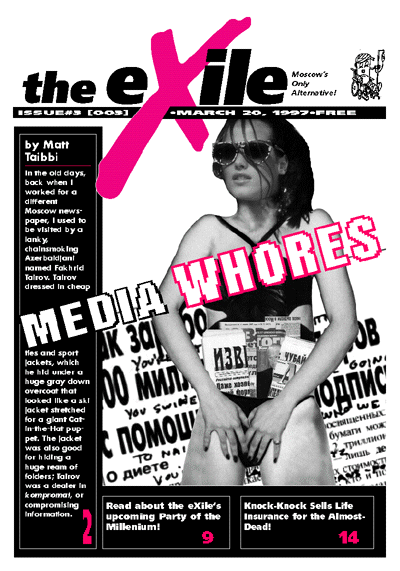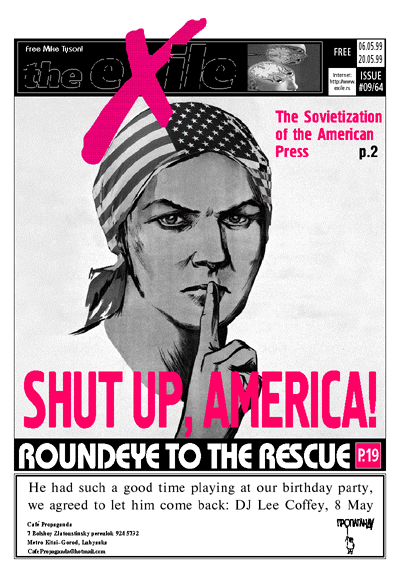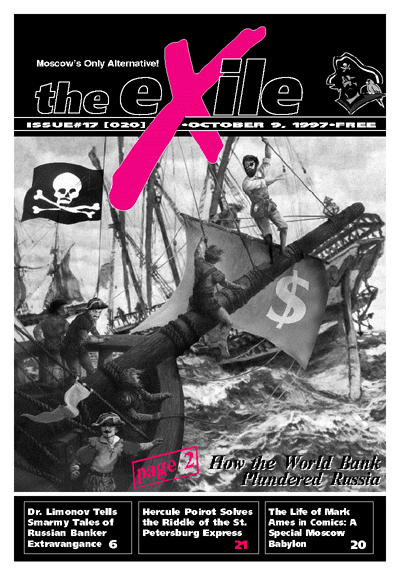the eXile: Bespredel for Expats
[5 items]
Any English speaker living in or visiting Moscow between 1997 and 2008 was eventually destined to pick up a copy of the eXile. This biweekly magazine, co-edited by American journalists Matt Taibbi (1970-) and Mark Ames (1965-), offered a unique combination of gonzo journalism, stiob, and investigative reportage while at the same time fetishizing the 1990s-era bespredel (lawlessness) and Western exploitation of Russia that it nominally exposed and condemned. In addition to classics of gonzo journalism like Hunter S. Thompson and Tom Wolfe, the eXile took its cues from post-Soviet publications–like Novyi vzgliad, Limonka, and Megapolis-ekspress—in other words, from venues that systematically blurred the boundaries between ironic distance and sincere political speech.
Even among its lurid peers, the eXile was disorienting. For one thing, it was the rare English-language publication willing to criticize economic “shock therapy,” the corruption of the Russian government, and the prominent role that the United States and international financial institutions played in exploiting Russia’s post-Soviet vulnerabilities. Taibbi’s article “Loans for Squares,” for instance, focused on a corrupt scheme involving the World Bank, the International Monetary Fund, and the infamous Harvard Institute for International Development. Such investigative pieces were published alongside accounts of the authors’ sexual escapades with local women, with detailed descriptions exhibiting a level of misogynistic bad taste bordering on sexual violence.
the eXile offered insightful discussions of the social and cultural significance of post-Soviet transition, as in Ames’ “Moscow Babylon.” The magazine criticized the extreme social inequality that Russia’s abrupt transition to capitalism had caused, assailing a Western economic and cultural colonialism that often took the form of unscrupulous, wealthy expats dating or simply taking advantage of Russian women who might not otherwise give them the time of day. The publication also included a guide to Moscow’s nightlife with club ratings focusing primarily on the likelihood of “getting laid,” getting in, or being beaten up. Another regular column was called “Death Porn,” and described the most gruesome and comical murders that had taken place in the Russian capital. The effect of this generic and tonal eclecticism was shocking and disturbing, mixing sophistication with dark irony and frat humor. Like some of its Russian counterparts, the eXile both demonized and celebrated the extreme chaos of the post-Soviet transition—highlighting the ambient instability, violence, and injustice while emphasizing seemingly unlimited freedom and opportunities.
A particularly interesting encounter between American and Russian stiob and political irony was the column “The Limonov X-Files.” Here, Eduard Limonov (1943-2020), already famous as the author of the provocative novel It’s Me, Eddie (Eto ia – Edichka, 1979/ 1991) and as the founder of the radical National Bolshevik Party and its press organ, Limonka, wrote about his political (mis)adventures and about Russian and international politics in his distinctively harsh and direct style. The twist was that Limonov’s texts appeared in his imperfect English, published without editorial intervention—with the result that they were quite funny to read and effectively communicated the raw, aggressive style of Limonov’s political writing in Russian.
Even among its lurid peers, the eXile was disorienting. For one thing, it was the rare English-language publication willing to criticize economic “shock therapy,” the corruption of the Russian government, and the prominent role that the United States and international financial institutions played in exploiting Russia’s post-Soviet vulnerabilities. Taibbi’s article “Loans for Squares,” for instance, focused on a corrupt scheme involving the World Bank, the International Monetary Fund, and the infamous Harvard Institute for International Development. Such investigative pieces were published alongside accounts of the authors’ sexual escapades with local women, with detailed descriptions exhibiting a level of misogynistic bad taste bordering on sexual violence.
the eXile offered insightful discussions of the social and cultural significance of post-Soviet transition, as in Ames’ “Moscow Babylon.” The magazine criticized the extreme social inequality that Russia’s abrupt transition to capitalism had caused, assailing a Western economic and cultural colonialism that often took the form of unscrupulous, wealthy expats dating or simply taking advantage of Russian women who might not otherwise give them the time of day. The publication also included a guide to Moscow’s nightlife with club ratings focusing primarily on the likelihood of “getting laid,” getting in, or being beaten up. Another regular column was called “Death Porn,” and described the most gruesome and comical murders that had taken place in the Russian capital. The effect of this generic and tonal eclecticism was shocking and disturbing, mixing sophistication with dark irony and frat humor. Like some of its Russian counterparts, the eXile both demonized and celebrated the extreme chaos of the post-Soviet transition—highlighting the ambient instability, violence, and injustice while emphasizing seemingly unlimited freedom and opportunities.
A particularly interesting encounter between American and Russian stiob and political irony was the column “The Limonov X-Files.” Here, Eduard Limonov (1943-2020), already famous as the author of the provocative novel It’s Me, Eddie (Eto ia – Edichka, 1979/ 1991) and as the founder of the radical National Bolshevik Party and its press organ, Limonka, wrote about his political (mis)adventures and about Russian and international politics in his distinctively harsh and direct style. The twist was that Limonov’s texts appeared in his imperfect English, published without editorial intervention—with the result that they were quite funny to read and effectively communicated the raw, aggressive style of Limonov’s political writing in Russian.




